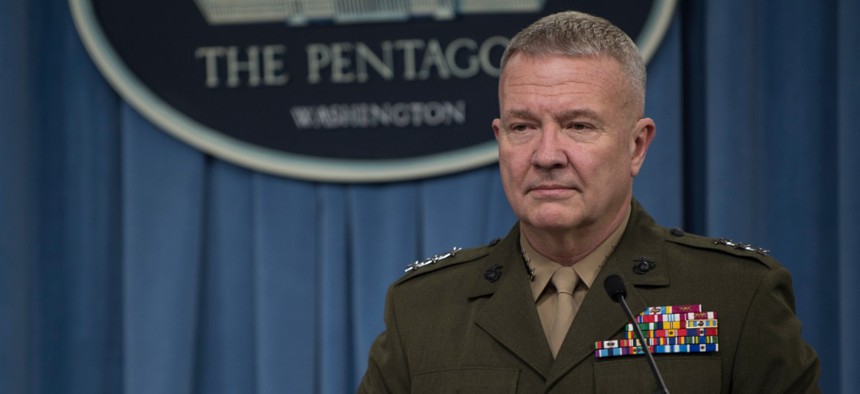McKenzie now finds himself in charge of U.S. forces in the Middle East at a time when the White House and Defense Department have articulated deliberate strategies of prioritizing challenges elsewhere, namely Russia and China. President Donald Trump has declared the Middle East a region where America should never have gotten involved in the first place, and called Syria in particular a land of “sand and death.” Centcom, which has commanded the lion’s share of the military’s resources for nearly two decades, is already seeing some of those resources shifting away.

The new head of U.S. forces in the Middle East, General Kenneth McKenzie, told some 6,000 U.S. personnel in the Arabian Gulf, "I am the reason you're here." Mass Communication Specialist 1st Class Kathryn E. Holm/Navy
Trump Might Not Want War, but the Military Is Steering His Iran Policy
The buildup in the Middle East is coming at the request of the forces responsible for the region.
Weeks of threats and counterthreats have culminated here: Iran shot down a U.S. surveillance drone overnight, marking the most serious escalation to date in the U.S.-Iran confrontation. The U.S. has been accusing Iran and its allies of repeated attacks against commercial shipping and U.S. allies and interests in Saudi Arabia and Iraq, but now, for the first time, Iran has claimed a direct attack on an American military target.
President Donald Trump responded on Twitter today with, “Iran made a very big mistake!” He sounded more conciliatory speaking with reporters later, when he speculated that someone “loose and stupid” must have screwed up somehow.
It’s been a little over a month since the U.S. kicked off a military buildup in the region in response to what officials called credible and imminent threats from Iran. On May 5, National Security Adviser John Bolton announced in a statement that a carrier strike group was headed to the region, and it came with a warning: “Any attack on United States interests or on those of our allies will be met with unrelenting force.” Though it was Bolton’s name on the statement, there was also someone else behind it: the new head of U.S. forces in the Middle East, General Kenneth McKenzie.
It was McKenzie who requested the carrier strike group, and secured two rounds of additional troop deployments to the Middle East afterward. As he told some 6,000 personnel on the aircraft carrier USS Abraham Lincoln as it steamed through the Arabian Gulf: “I am the reason you’re here.” Centcom also publicized intelligence, in the form of video and photos, tying Iran to attacks against six separate tankers near the Strait of Hormuz in the past several weeks.
Since May, Bolton has served as an occasional spokesman for the administration’s Iran policy and is actively helping drive it behind the scenes. But lost in the focus on Bolton’s views was McKenzie’s role in helping shape the current policy. At a time when administration officials insist that they seek not war but diplomacy, America’s Iran policy is being steered to a large extent by the military.
McKenzie fills a vacuum at a moment when the Pentagon’s civilian leadership is either in temporary posts or in chaos, with multiple senior roles filled by acting officials, and one acting defense secretary just swapped out for another. And some see his prominent role as a cause for worry, even as other defense officials reportedly try to tamp down tensions. “He is shaping a public narrative around the Iran threat that is not a normal scenario for a combatant commander,” Kelly Magsamen, who worked with McKenzie as a senior defense official, told me. “I think it’s dangerous because this puts our military leadership in a scenario that’s highly political,” said Magsamen, who is now the vice president for national security and international policy at the Center for American Progress, a left-leaning think tank.
McKenzie is one of a generation of military leaders who have spent much of their careers in the Middle East. He saw the Iranian threat firsthand when he led a Marine Expeditionary Unit during the Iraq War, when Iranian proxies and allies were routinely attacking U.S. troops. The George W. Bush administration never retaliated directly against Iran. Trump-administration officials have noted that, from 2003 to 2011, Iran-backed militias killed more than 600 Americans. After 2014, however, the United States and Iran-backed militias in Iraq ended up in a tense de facto alliance as both fought against the Islamic State. But once the group was driven out of territory it controlled, the U.S. and Iran lost a common interest.
But the trend may start to reverse if McKenzie gets his way. In an interview on the aircraft carrier, he told The Wall Street Journal that he was considering recommending returning to a larger U.S. military footprint in the region, where the U.S. has begun to draw down in Syria following the territorial defeat of ISIS. The new deployments since May, including 2,500 additional troops and a Patriot missile-defense battery, have only partly replaced assets withdrawn from the region just in the past year.
McKenzie’s ambitions aren’t necessarily unusual. “Every combatant commander always wants more forces,” Magsamen said. “There’s never enough forces, and Central Command is in particular notorious for kind of waving their arms in the air and saying we must have more forces.” In past years, for example, Centcom had two aircraft carriers continuously in the region; the Abraham Lincoln, though, had been in the Mediterranean on its way to the region when its deployment was sped up.
In the current case, moreover, the deployments were relatively minor and routine. What made them especially noteworthy was the public messaging surrounding them.
Some say the attacks demanded the buildup, which the military characterizes as deterrent and defensive—many of the recent deployments have been related to surveillance and missile defense. When a combatant commander sees evidence of an imminent threat, as the military has described it, there are three options, according to Brad Bowman, who directs the Center on Military and Political Power at the Foundation for Defense of Democracies. “One would be to retreat, and that will only invite more of the same from our adversaries,” he told me. “Two would be to do nothing, and that would leave our troops unprotected and arguably would be a dereliction of duty. And three would be to increase our force posture to ensure that our troops are protected and that we’re prepared to deter and, if necessary, defeat aggression.” McKenzie picked the third option, which in Bowman’s view was the right choice.
Some lawmakers are skeptical. Adam Smith, the Democratic chairman of the House Armed Services Committee, called the buildup “concerning” in a statement earlier this week and cited the risk of miscalculation “clearing a path for an unwanted all-out armed conflict.”
Some argue that a ramp-up contradicts the goals laid out in the National Defense Strategy, which is supposed to be guiding the military’s decisions. McKenzie, however, has noted that the document also calls for contending with the challenges of North Korea, Iran, and violent extremism. In a May speech at the Foundation for Defense of Democracies, which is known for advocating a hard line on Iran and is close to the administration, McKenzie laid out his own vision this way: “Any major fight we are going to be involved in will be, in all likelihood, transregional versus regional … It will cut across multiple combatant commands and involve all domains.”
But he left no doubt about the priorities in his own area of responsibility. “The long-term, enduring, most significant threat to stability [in the region] is Iran and the Iranian regime’s malign, hegemonistic ambitions across the theater and, indeed, globally,” he said. “While we do not seek war, Iran should not confuse our deliberate approach with an unwillingness to act.”
It’s not clear yet, though, where the current buildup leaves the Defense Department’s longer-term objectives to focus on great-power competition. “China is a much, much more significant military challenge than Iran,” Elbridge Colby, a former defense official and one of the architects of the National Defense Strategy, told me. “We absolutely must focus on China and to a lesser extent Russia, and figure out ways to deal with Iran in a more economical fashion. Some of the ideas being floated seem totally inconsistent with that.”
Indeed, a congressionally mandated report reviewing the National Defense Strategy highlighted the Middle East as a particular challenge to implementing the vision. “U.S. security commitments and operations in the Middle East cannot be wished away,” the authors noted. “As long as terrorism is exportable, as long as the Middle East remains a major producer of oil, and as long as the United States has key U.S. allies and partners in the region, U.S. interests in the Middle East will be profound.”
This may be even more the case as the Trump administration continues to pressure Iran over its regional behavior and Tehran responds by amping up its threats. Trump may then discover, as the previous administration did, that just because he wants to focus on other things doesn’t mean he can. And McKenzie will help keep the U.S. focus on the Middle East.







